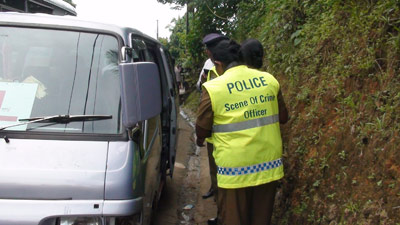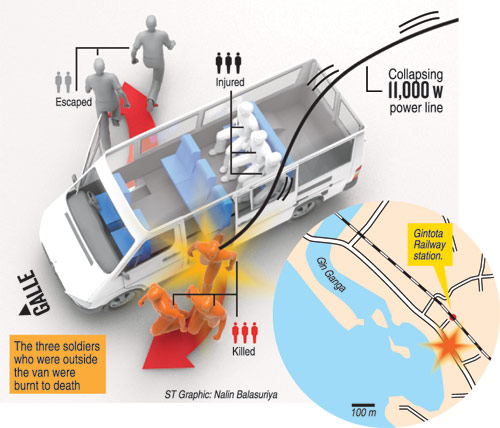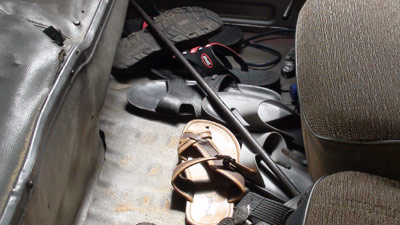News
Perishing powerlines put people in peril
The electrocution of three soldiers in Galle by a falling 11, 000 watt power cable along the coastal line in Galle last week has raised questions of the safety of these lines.

The scene of the tragedy. Pic by Gamini Mahadura
Residents complain that regular checks are not carried out and such checks were necessary as the power lines could get corroded as they were located close to the sea.
The incident has also raised questions regarding the delayed response of the Ceylon Electricity Board and why the power line was not get disconnected soon after the cable snapped off the post.
CEB General Manager M.C. Wickramesekera said investigations were ongoing and safety standards would be implemented more stringently.
Three soldiers died and three others and their driving instructor sustained burn injuries after the power line fell on their vehicle on Galle Road near the crossroads leading to the Gintota Railway Station.
| Driving instructor had no licencePolice have arrested the driver of the van who had acted as the driving instructor. He has been charged for failure to possess a licence to serve as an instructor and for carrying more passengers than he should have. He should have only had two learners. The driver was given Rs 100,000 bail. However, the police have so far not taken any action against LECO that is responsible for the power supply in the area. |
The soldiers were attached to the Boossa Army Camp. The incident occurred while they were taking driving lessons with an instructor from a driving school in Ambalangoda.
The vehicle, a van, had stopped by the side of the road, and the person in the driving seat had barely got out of it to make way for the next learner when the blazing power line fell with a loud noise, close to the van.
The three soldiers — Hemal Nanayakkara (25); P.G. Anusha Bandara (28) and I.M. Ranjith (35) — were outside the van and were burnt to death when the powerline came in contact with them.
The four, who were inside the van, also suffered burn injuries. They are being treated at the Karapitiya Hospital, Galle.
CEB Chief engineer E.K. Indrarathna said the power line had fallen after getting ignited when a squirrel made contact between the powerline and the earthwire. The animal also died.
Lance corporal K.M. Thusitha Madhusankha who survived the tragedy said the power line fell just as the person sitting in the driving seat opened his door. He said the CEB arrived 15 minutes later.
Prof. Nalin Wickramaarachchi, Moratuwa University’s Electrical Department Head, commenting on the safety measures said, “Electrical contact between an object on the ground and an energised wire can occur even though the two do not come into contact. In the case of high-voltage lines, electricity can pass across an air gap.”

Inside the van: Tell tale signs of a moment of panic
Most power lines do not follow a direct line from the top of one pole to another. They sag between poles and can be as much as three or four metres below the cross-arms supporting them.
This is where power lines most often accidentally come into contact. Power lines can also sway in the wind and sag as temperatures rise, so what appears to be a safe working distance may later expose people or property to serious risk, Prof. Wickramaarachchi said.
“Area residents should be familiar with the layout of the overhead electrical system on or near their property and how far one needs to be away from these power lines,” he said.
Irrigation Department Director and Engineer D.P. de Silva said, “While moving irrigation pipes under or near powerlines, one should place them away from overhead wires.
Electricity can be conducted through water; so we do not allow the irrigation system to spray a continuous stream close to power lines or towers.”
Damitha Kumarasinghe, Director General of the Public Utilities Commission of Sri Lanka (PUCSL), said they were launching a programme with the assistance of the Ceylon Electricity Board (CEB), the Lanka Electricity Company (LECO) and police to reduce the number of deaths due to electrocution.
He said including safety measures in school textbooks would be helpful to create awareness.
He said 30 to 45 per cent of deaths could be prevented if trip switches were installed. Illegal electricity tapping, unsafe wiring, electrical traps for wild animals were other major causes of death by electrocution.

